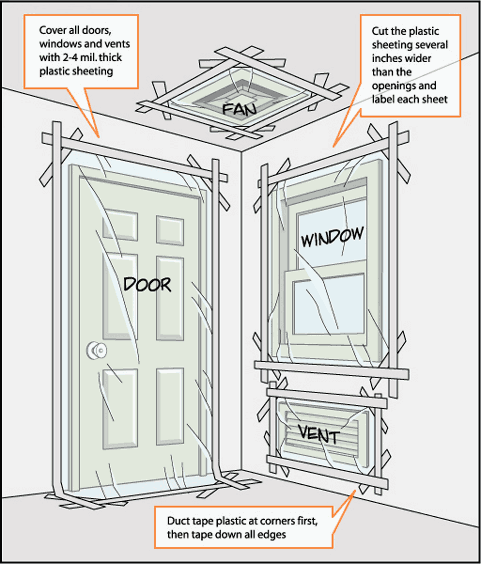A nuclear or radiological emergency might be an accident at a nuclear power plant, the use of a small nuclear weapon or someone setting off a “dirty bomb.” When a dirty bomb explodes, it sends off dangerous radioactive material over a certain area. Radiation's health effects can be mild, like reddening of the skin, or very serious, like cancer or even death.
![]()
BEFORE A NUCLEAR OR RADIOLOGICAL EMERGENCY HAPPENS:
-
Be sure you have your emergency supply kit ready.

-
Make sure you know where and how to get information from your city or town.
-
If you live within 10 miles of a nuclear power plant, you should know the evacuation routes for your neighborhood.
![]()
WHEN A NUCLEAR OR RADIOLOGICAL EMERGENCY HAPPENS:
-
During and after a release of radioactive materials, local, state and federal authorities will watch the levels of radiation and tell you what you should do to protect yourself.
-
The best action will depend on the emergency. Tune to your local TV, radio stations and Internet for information and instructions during any emergency.
-
If a lot of radioactive material is released in a radiological emergency, you may be told to "shelter in place," which means to stay indoors where you are; or you may be told to move to another location.
If you are told to shelter in place, you should do the following:
-
Close and lock all doors and windows.
-
Turn off fans, air conditioners, and forced-air heating units that bring in fresh air from the outside. Only use units that recirculate air that is already in the building.
-
Close fireplace dampers.
-
If you can, bring pets inside.
-
Move to an inner room or basement.
-
You may also consider sealing the room (see Sealing the Room, below)
-
Keep your radio tuned to the emergency response network or local news to find out what else you need to do.
-
Do not leave your shelter until you are told that it is safe by local officials.
-
If you are told to evacuate, follow the directions from your local officials. Leave the area as quickly and orderly as possible. Also:
-
Turn off the fan, air condition, and heating system in your car. These bring in air from the outside. Close your vents and keep your windows rolled up.
-
Take your emergency supply kit, medicines you need, extra clothes, cash and credit cards.
-
Take pets only if you are using your own vehicle and going to a place you know will accept animals. Emergency vehicles and shelters usually will only accept service animals and may not accept pets.
-
![]()
AFTER A NUCLEAR OR RADIOLOGICAL EMERGENCY:
- Check your local TV and radio stations and the Internet for official news, information and instructions.
![]()
During a chemical, nuclear or radiological emergency, the air outside may be dangerous. For short periods of time, "sealing the room" can help protect you and your family from harmful air outside. If you see large amounts of debris in the air, or if local officials say the air is dangerous, you may want to take this kind of action.
Choose one room in the middle of your home or a room with no windows as your shelter. When you move to your shelter, use duct tape and plastic sheeting to seal any doors, windows, or vents in case a chemical or radiation plume is passing over (listen to your radio for instructions). Within two or three hours, you should take down the plastic and duct tape and air out the room. You can suffocate if you keep the room tightly sealed for more than five hours.
To seal a room:
- Seal all windows, rooms and air vents in one room with 2-4 mil. thick plastic sheeting and duct tape. You might want to measure an duct the plastic sheeting in advance to save time.
- Cut the plastic sheeting at least six inches wider than the openings and label each sheet.
- Duct tape plastic at corners first and then tape down all edges.
Connecticut has special plans in case there is an emergency at the nuclear power plants at the Millstone Station in Waterford, Connecticut or Indian Point in Buchanan, New York. These plans include steps the state takes to protect the health and safety of all Connecticut residents. If an emergency happens at one of these facilities, public safety officials will begin the state emergency response plan and tell residents what is going on and what to do.



